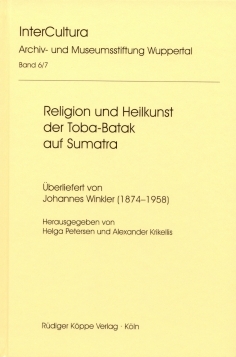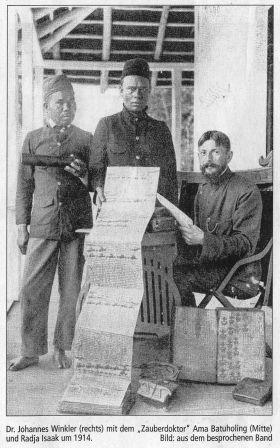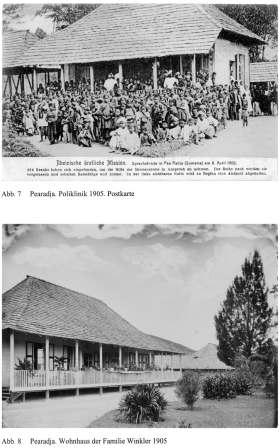




At the outset of the 20th century, Johannes Winkler lived and worked for 24 years as a missionary physician in the area south of Lake Toba in the North of Sumatra. Winkler considerably contributed to the establishment and enhancements of a common health care system and of medical attendance. He also was conductive to the construction and expansion of hospitals as well as to the qualified education of indigenes staff, so that his efforts strongly influenced the work of medical missions as a whole.
Through his interest in ethnology, his closeness to the Batak people, and a relationship with a magician priest, who has been a connoisseur of traditional Batak medicine, Winkler gained a deep insight into the world of faith of this people. He published this wide knowledge 1925 in his book Die Toba-Batak auf Sumatra – in gesunden und kranken Tagen (The Toba-Batak in Sumatra in healthy and diseased days) with the subtitle Ein Beitrag zur Kenntnis des animistischen Heidentums (A contribution to the acknowledgment of animist heathendom). Winkler’s work – containing traditional religious concepts and medical knowledge of the Toba-Batak – is a great repository for ethnologists, comparative religious researchers, and mission historians. Since many years this book is only available in some specialized libraries and sporadic in antique shops.
The editors, a granddaughter and a great-grandson Winkler’s, revised, supplemented and enhanced the present study with hitherto unpublished parts of the original manuscript. Furthermore, they compiled a highly informative biography of Winkler and his family, containing many private details of his life.
Thus the reader comes to know about Winkler’s intensive efforts in documenting the culture of the Batak by means of ethnographical collections for the Hamburger Museum für Völkerkunde (Museum of Ethnology Hamburg/Germany). The appendix includes some short texts Winkler had written for professional journals, and an index of all his published books and articles as well as the handwritten manuscripts, which are still in his estate.
Under these links you will find further (auto)biographical accounts and documents of pioneering work for African and Asian health systems:
dhe in Schwäbisches Tagblatt, 5.9.2007, x
Peter van Eeuwijk in Anthropos, 103, 2/2008, 616-617
Susanne Rodemeier in curare, 31/2+3, 2008, 248-250
This volume includes the new edition of Winkler’s book “Die Toba-Batak auf Sumatra in gesunden und kranken Tagen”, published in 1925, and other texts by Winkler, the missionary physician belonging to the Protestant mission of the “Rhenish Missionary Society”, as well as photographs owned by his family. The editors want to contribute to the present debate on western medicine and traditional healing because Western doctors encountered indigenous cultures in many forms, which resulted in (pre-conceived) generalizations about indigenous cultures about: “heathenism”, superstition, ineffective diagnosis and treatment, and quack medicine, added by the attitude of potential superiority of Christianity and western medicine. So, traditional healers were, in the first phase, frequently seen as phenomena of the “Antichrist”. In later years the accounts of indigenous culture became more qualified. Winkler’s other texts deal with midwifery, village life, Beriberi, the beginnings of medical mission, music of the Batak, the Batak script, the Usir game, the 6000-year calendar, and the book has maps, a list of Winkler’s publications, and a list of ethnographic artifacts.
Ulrich Oberdiek in Anthropological Abstracts, www-7/2008, 7074
© 2026 by Rüdiger Köppe Verlag – www.koeppe.de